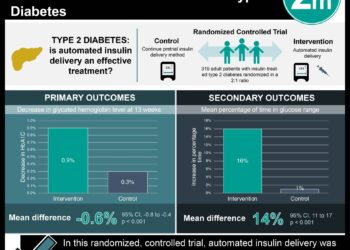Insulin analogs compared to NPH not associated with reduced hypoglycemia-related hospitalizations
1. In this retrospective cohort study, for patients with type 2 diabetes, initiation of a basal insulin analog compared with NPH insulin was not associated with a reduced risk of hypoglycemia-related ED visits or hospital admissions.
2. Though NPH insulin led to a small but significantly greater decrease in HbA1c after one year compared to basal insulin, it is unlikely to be clinically significant.
Evidence Rating: 3 (Average)
Study Rundown: In patients with type 2 diabetes, up to one quarter of patients eventually require initiation of insulin to reach recommended glycemic targets. While the mainstay for treatment has been human synthetic insulin, insulin analogs have become increasingly popular and it is unclear how the two compare in terms of risk of hypoglycemic events. In this retrospective cohort study, for patients with type 2 diabetes, initiation of a basal insulin analog compared with NPH insulin was not associated with a reduced risk of hypoglycemia-related ED visits or hospital admissions. Though NPH insulin led to a small but significantly greater decrease in HbA1c after one year compared to basal insulin, it is unlikely to be clinically significant.
Though this study suggests that basal insulin analogs do not result in reduction of extreme hypoglycemic episodes, there are numerous limitations. First, because this study was retrospective, it is subject to confounding. Second, the primary outcome of this study did not include emergency responses for hypoglycemia that did not warrant hospitalization, potentially underestimating the true number of severe hypoglycemic events. Third, these findings were from an integrated health care delivery system (Kaiser Permanente) and may not necessarily be generalizable to other settings. Fourth, the comparisons between NPH and basal insulin analogs did not include convenience, number of injections required, or mode of delivery (vial vs pen), and this may account for the differences observed in other studies.
Click to read the study, published in JAMA
Relevant Reading: Type 2 Diabetes and Glycemic Control with Insulin Glargine vs NPH
In-Depth [retrospective cohort study]: Between 2006 and 2014, there were 25,489 patients with type 2 diabetes who initiated basal insulin therapy (mean age, 60.2 [SD 11.8] years; 51.9% white, 46.8% female). Among these patients, 23,561 (92%) started with NPH insulin and 1,928 (8%) started with insulin analogs. During a mean follow-up of 1.7 years, there were 39 hypoglycemia-related ED visits or hospital admissions among 1928 patients who initiated insulin analogs (11.9 events per 100 person-years; CI95 8.1 to 15.6) compared with 354 hypoglycemia-related ED visits or hospital admissions among 23,561 patients who initiated NPH insulin (8.8 events per 100 person-years; CI95 7.9 to 9.8). Within 1 year of insulin initiation, hemoglobin A1c level decreased from 9.4% (CI95 9.3 to 9.5%) to 8.2% (CI95 8.1 to 8.2%) after initiation of insulin analogs and from 9.4% (CI95 9.3 to 9.5%) to 7.9% (CI95 7.9 to 8.0%) after initiation of NPH insulin (adjusted difference for glycemic control -0.22%; CI95 -0.09 to -0.37%).
Image: CC/Wiki
©2018 2 Minute Medicine, Inc. All rights reserved. No works may be reproduced without expressed written consent from 2 Minute Medicine, Inc. Inquire about licensing here. No article should be construed as medical advice and is not intended as such by the authors or by 2 Minute Medicine, Inc.







